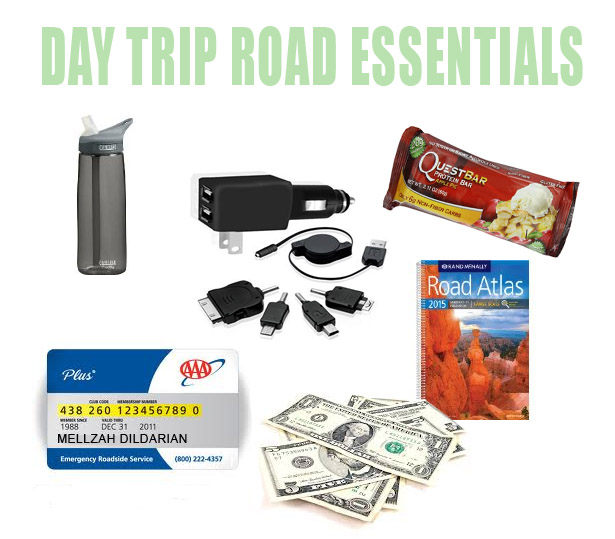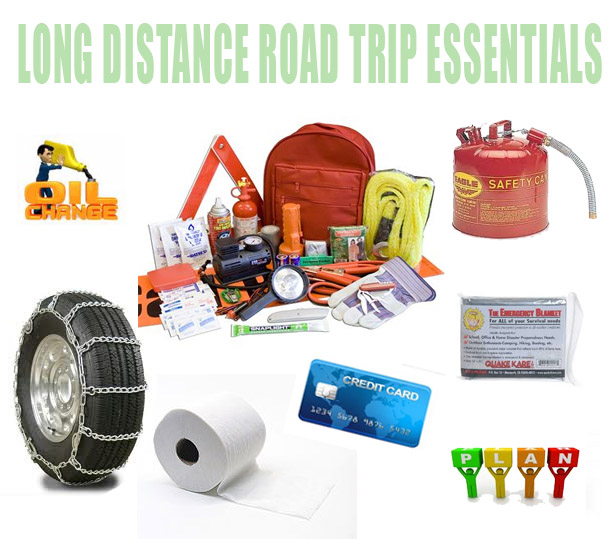Summer is almost here, which means it’s time for that hallowed American tradition: the road trip. Whether you’re packing for a day trip or a longer excursion, here’s my list of road trip essentials, some of which I learned that I needed the hard way. These are the must-haves–feel free to supplement with the fun stuff like custom playlists and cameras and your world’s largest burger eating hat. This is the stuff that minimizes your vulnerability when you’re out on the road so you can concentrate on having fun!
- Water — I don’t care if it’s in a disposable bottle, a camelbak, or one of those uber health conscious BPA free aluminum or glass things. In the event of a breakdown where you have to wait for help or if you get caught in an unexpected traffic nightmare, staying hydrated is important on a hot summer day when you’re trapped in a sweltering sweatbox. In a pinch, you can put it in your radiator if your car is overheating and you just need to be able to limp it to the next town. I’ve had two cars with radiator problems, and while water is not the IDEAL fluid (coolant is best), it will work temporarily.
- Snacks — little bags of nuts are perfect to keep you energized and keep away the hangries. For something a little more substantial, Quest bars are my favorite. Again, just something that fits your dietary needs and can hold you for a few hours if need be–I don’t care if you pack a cooler of sandwiches or grill eggs on your engine block or live for bags of funyons, just have something.
- AAA card — This has saved my bacon more than once. Once on a longer trip when we blew not one, but TWO tires outside of LA, and once on a cross-town trip when I blew a tire going to an event that most of my friends were already at (phones off!). If you can swing it, go for one of the higher membership tiers as they cover a LOT more towing miles (100-200 miles vs 5 miles) and the per mile fee outside of the covered range adds up fast.
- Map — GPS devices and phones are great for directions…until they aren’t. Lose the signal, deplete your battery, run up to an unexpected road closure, and you’re in trouble. On a trip to Vancouver, we didn’t pull out the GPS until after we crossed the border (as it’s a straight shot up until that point), and were unpleasantly surprised to discover that our GPS had decided that there were only two provinces in Canada, neither of which were British Columbia, so we were left scrambling for a gas station that was still open that late at night. It was terrible. If you’re a AAA member, you can even get city/state/regional maps for free, so learn from my mistake and have one in your car.
- Car multi charger– you can charge on the road, you can charge in your hotel/motel/Holiday Inn. This will save you from having to remember how to read a map and from being in an “Oh shit, I had a full battery this morning, what happened?!” situation.
- Cash. ALWAYS. HAVE. SOME. CASH. It doesn’t need to be a ton, just enough for unexpected tolls, for some gas, for roadside stuff. Don’t assume that anybody anywhere accepts credit cards. Ideally, you’ll have this cash in a few locations–some on your person, some (hidden) in the car.
Everything from the shorter trip section plus:
- Gas can — There are some long stretches of road with few services, or services that aren’t 24 hours. It doesn’t hurt to fill up when you hit the half-tank mark, especially if you’re unfamiliar with the road ahead. I assumed there’d be another gas station within driving distance when I was passing through North Dakota and I almost ran out of gas because the cute little gas station in Medora near Theodore Roosevelt National Park was closed for the day and I had to backtrack MILES (like 30+) on E to one I’d seen earlier because I didn’t have enough gas to go for anything other than the sure bet at that point. This was pre smartphone, with printed out mapquest directions, and I was alone, with no AAA or any other safety net. If I hadn’t made it back to the gas station (and I made it with about a shot glass’ worth of gas left in the tank), I would have been in trouble. Don’t put yourself in that kind of trouble.
- Full size spare tire with a tire jack, and you should know how to use it, ESPECIALLY if you don’t have roadside assistance. None of this doughnut crap when you’re hundreds of miles from home.
- A car safety kit with jumper cables, a flashlight, some road flares, screw driver, duct tape, bandages, and spare batteries. It doesn’t matter what brand, there are plenty out there for around $20.
- A blanket, whether it’s one of those thermal space age ones or just a regular blanket. Something to keep you warm if you’re waiting at night for roadside assistance.
- If you’re crossing mountain passes, have chains, and know how to use them. Odds are you won’t need them (especially in the summer), but they can be lifesaving if you do.
- Toilet paper, because rest stop bathrooms are often terrible to borderline unusable.
- A credit card with enough to deal with a emergency situation. If you’ve got one where you can earn frequent flyer miles by buying stuff like gas on THIS trip to help fund your NEXT trip, even better.
- Get an oil change/check your fluids before you go. Get a tune-up! If anything is going to go drastically wrong with your car, it’s going to happen on these longer trips when the car is running for 12+ hours a day instead of in 30 minute bursts across town.
- Above all, have a plan. You don’t have to plan every minute, but you should have a rough idea of how long you’re going to travel each day, potential stopping points, and for what you’re going to do at night. Drive in shifts? Stop at a rest stop? Check in at a hotel? You don’t want to be in the middle of nowhere, exhausted, and have to face the question of sleeping somewhere you feel unsafe versus continuing to drive and risk falling asleep on the road. If you decide to sleep in your car for whatever reason but you’re closer to a town than a highway rest stop, keep your eyes peeled for a Wal-Mart. Regardless of how you feel about their business practices, their parking lots are generally open to car campers and are well lit and potentially more secure than a rest stop. Use your personal discretion, as always, and never stay anywhere that makes you feel unsafe.
Some of this stuff you’ll use, some of it you’ll toss in the trunk and never use. The important thing is to have it if you need it. This stuff keeps you safe, keeps you going, and keeps you from having to wipe with your sleeve. It’s a big, beautiful country out there–go see it!


